
openspg
OpenSPG is a Knowledge Graph Engine developed by Ant Group in collaboration with OpenKG, based on the SPG (Semantic-enhanced Programmable Graph) framework. Core Capabilities: 1) domain model constrained knowledge modeling, 2) facts and logic fused representation, 3) kNext SDK(python): LLM-enhanced knowledge construction, reasoning and generation
Stars: 591
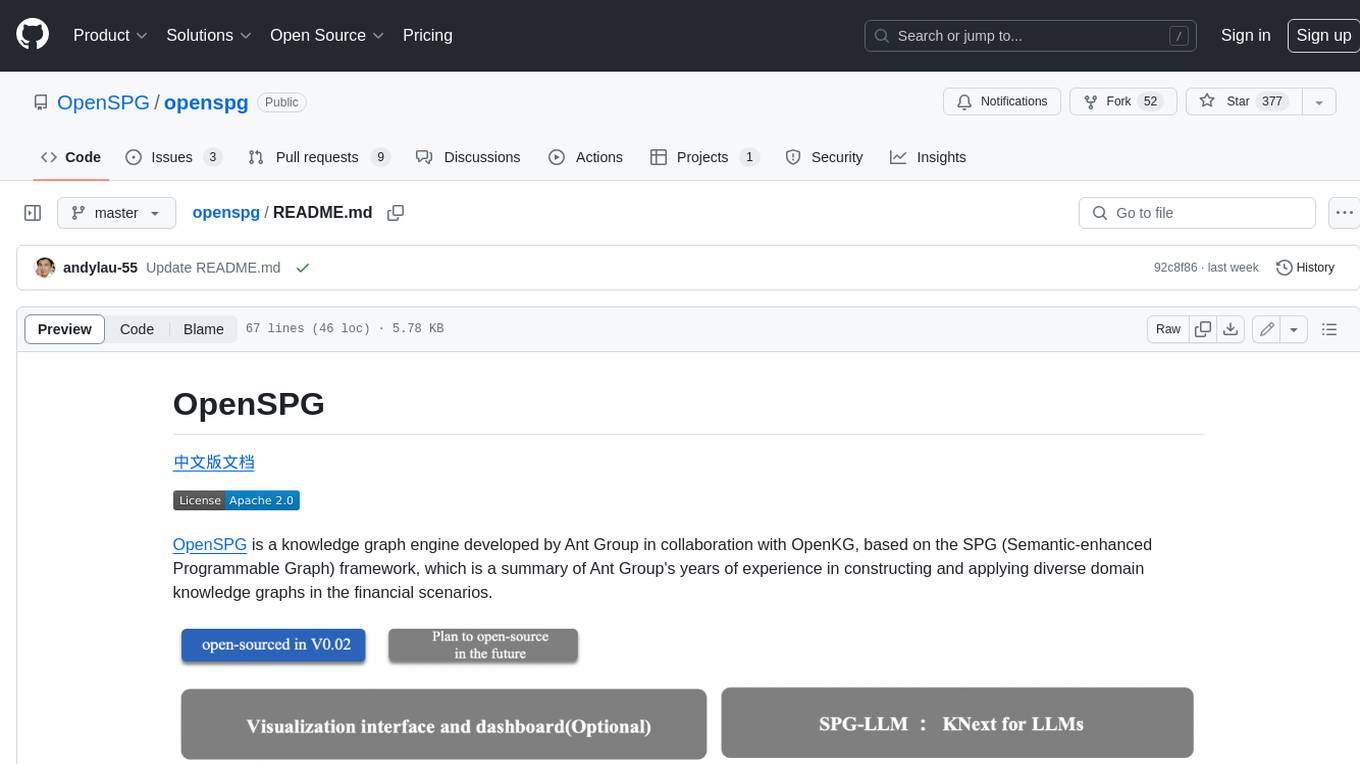
OpenSPG is a knowledge graph engine developed by Ant Group in collaboration with OpenKG, based on the SPG (Semantic-enhanced Programmable Graph) framework. It provides explicit semantic representations, logical rule definitions, operator frameworks (construction, inference), and other capabilities for domain knowledge graphs. OpenSPG supports pluggable adaptation of basic engines and algorithmic services by various vendors to build customized solutions.
README:
OpenSPG is a knowledge graph engine developed by Ant Group in collaboration with OpenKG, based on the SPG (Semantic-enhanced Programmable Graph) framework, which is a summary of Ant Group's years of experience in constructing and applying diverse domain knowledge graphs in the financial scenarios.
SPG (Semantic-enhanced Programmable Graph): semantic-enhanced programmable framework is a set of semantic representation framework based on property graph precipitated by Ant Knowledge Graph platform after years of supporting business in the financial field. It creatively integrates LPG structural and RDF semantic, which overcomes the problem that RDF/OWL semantic complexity cannot be industrially landed, and fully inherits the advantages of LPG structural simplicity and compatibility with big data system. The framework defines and represents knowledge semantics from three aspects. First, SPG explicitly defines the formal representation and programmable framework of "knowledge", so that it can be defined, programmed, understood and processed by machines. Secondly, SPG achieves compatibility and progressive advancement between knowledge levels, supporting the construction of knowledge graphs and the continuous iterative evolution of incomplete data states in industrial-level scenarios. Finally, SPG serves as an effective bridge between big data and AI technology systems, facilitating the efficient transformation of massive data into knowledge-based insights. By doing so, it enhances the value and application potential of the data. With the SPG framework, we can construct and manage graph data more efficiently, and at the same time, we can better support business requirements and application scenarios. Since SPG framework has good scalability and flexibility, new business scenarios can quickly build their domain models and solutions by extending the domain knowledge model and developing new operators.
For a detailed introduction to SPG, please refer to the 《SPG White Paper》 jointly released by Ant Group and OpenKG.
OpenSPG is an open engine for knowledge graph designed and implemented on the basis of SPG framework, which provides explicit semantic representations, logical rule definitions, operator frameworks (construction, inference) and other capabilities for the domain knowledge graphs, and supports pluggable adaptation of basic engines and algorithmic services by various vendors to build customized solutions.
OpenSPG Core Capabilities:
- SPG-Schema semantic modeling
- Schema framework responsible for semantic enhancement of property graphs, such as subject models, evolutionary models, predicate models, etc.
- SPG-Builder knowledge construction
- Supports the construction of both structured and unstructured knowledge.
- Compatible and articulated with big data architecture, provides a knowledge construction operator framework to realize the conversion from data to knowledge.
- Abstracts the knowledge processing SDK framework, provides the ability of entity linking, concept standardization and entity normalization operators, combines Natural Language Processing (NLP) and deep learning algorithms, improves the uniqueness level of different instances within a single type. Furthermore, it supports the continuous iterative evolution of the domain knowledge graphs.
- SPG-Reasoner logical rule reasoning
- Abstracts KGDSL (Knowledge Graph Domain Specific Language) to provide programmable symbolic representation of logic rules.
- Supports downstream tasks, such as rule inference, neural/symbolic fusion learning, KG2Prompt linked LLM knowledge extraction/knowledge reasoning, represented in machine-understandable symbolic form.
- Define dependency and transfer between knowledge through predicate semantics and logic rules, and support modeling and analysis of complex business scenarios.
- Programmable Framework -- KNext
- As a programmable framework of knowledge graph, KNext offers a set of extensible, procedural, and user-friendly components;
- It abstracts the core capabilities of knowledge graphs, congealing them into componentized, framework-oriented, and engine-built-in capabilities;
- Achieves isolation between the engine and business logic, domain models, facilitating rapid definition of knowledge graph solutions for businesses;
- Constructs a controllable AI technology stack driven by knowledge, based on the OpenSPG engine, connecting deep learning capabilities such as LLM and GraphLearning.
- Cloud Adaptation Layer -- Cloudext
- Business systems build their own characteristic business front-end by interfacing with open SDKs
- Extensible/adaptable customized graph storage/graph calculation engine
- Extensible/adaptable machine learning framework suitable for their own business characteristics
- Install OpenSPG
- Quick start with examples:
For Tasks:
Click tags to check more tools for each tasksFor Jobs:
Alternative AI tools for openspg
Similar Open Source Tools

openspg
OpenSPG is a knowledge graph engine developed by Ant Group in collaboration with OpenKG, based on the SPG (Semantic-enhanced Programmable Graph) framework. It provides explicit semantic representations, logical rule definitions, operator frameworks (construction, inference), and other capabilities for domain knowledge graphs. OpenSPG supports pluggable adaptation of basic engines and algorithmic services by various vendors to build customized solutions.
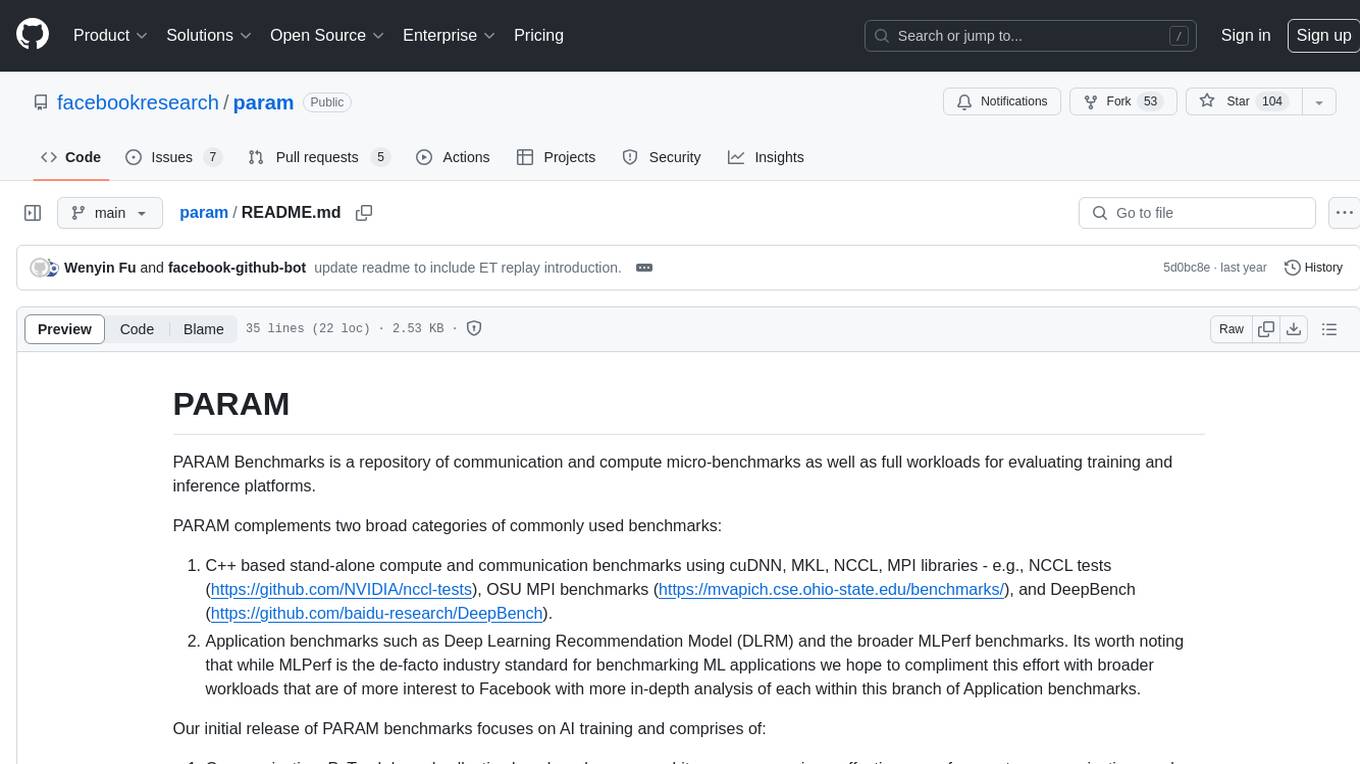
param
PARAM Benchmarks is a repository of communication and compute micro-benchmarks as well as full workloads for evaluating training and inference platforms. It complements commonly used benchmarks by focusing on AI training with PyTorch based collective benchmarks, GEMM, embedding lookup, linear layer, and DLRM communication patterns. The tool bridges the gap between stand-alone C++ benchmarks and PyTorch/Tensorflow based application benchmarks, providing deep insights into system architecture and framework-level overheads.
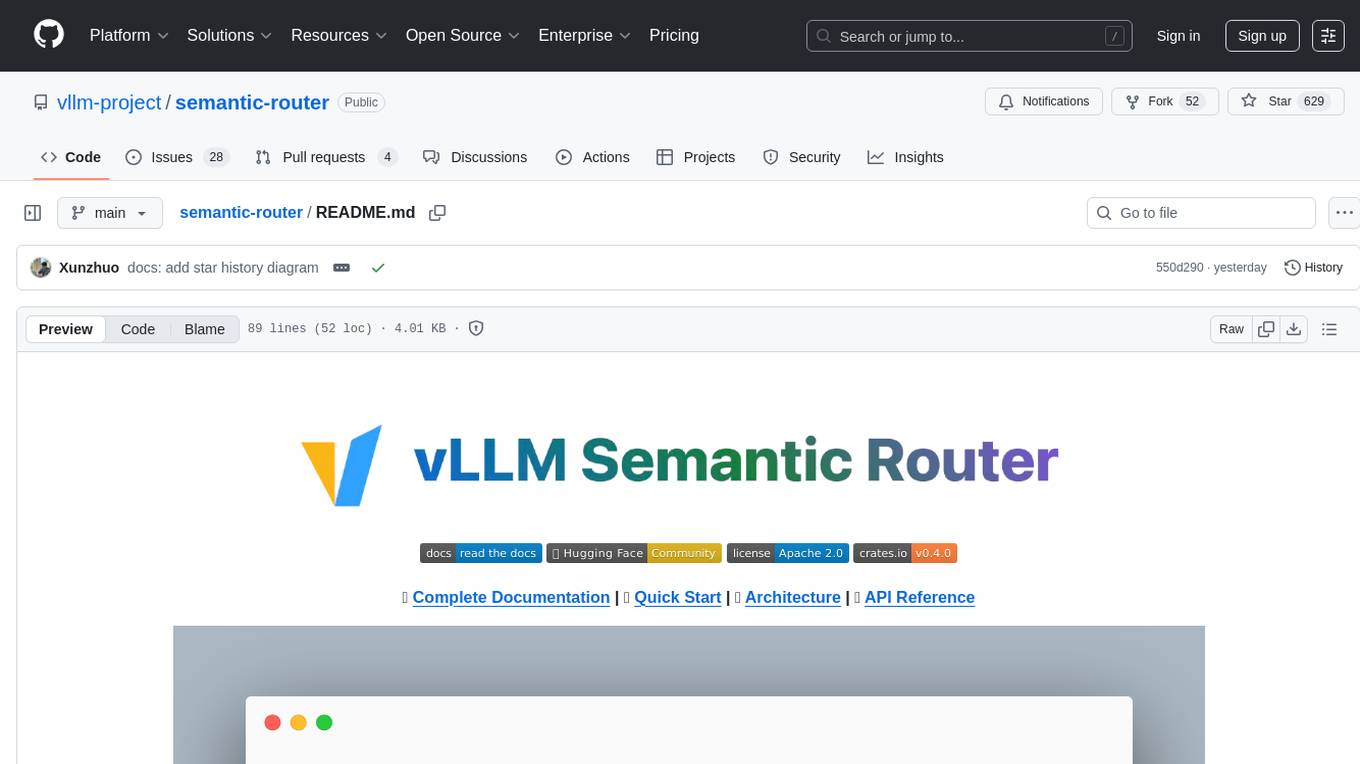
semantic-router
The Semantic Router is an intelligent routing tool that utilizes a Mixture-of-Models (MoM) approach to direct OpenAI API requests to the most suitable models based on semantic understanding. It enhances inference accuracy by selecting models tailored to different types of tasks. The tool also automatically selects relevant tools based on the prompt to improve tool selection accuracy. Additionally, it includes features for enterprise security such as PII detection and prompt guard to protect user privacy and prevent misbehavior. The tool implements similarity caching to reduce latency. The comprehensive documentation covers setup instructions, architecture guides, and API references.
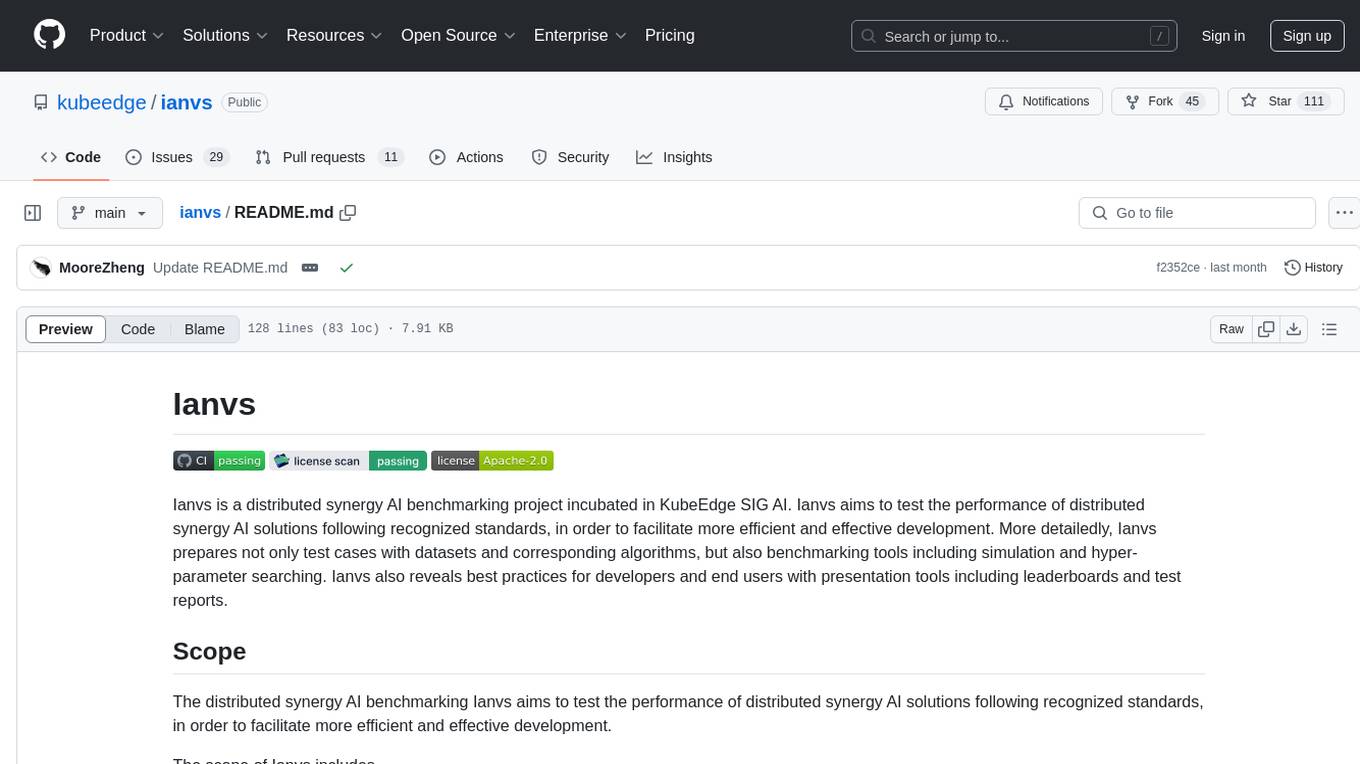
ianvs
Ianvs is a distributed synergy AI benchmarking project incubated in KubeEdge SIG AI. It aims to test the performance of distributed synergy AI solutions following recognized standards, providing end-to-end benchmark toolkits, test environment management tools, test case control tools, and benchmark presentation tools. It also collaborates with other organizations to establish comprehensive benchmarks and related applications. The architecture includes critical components like Test Environment Manager, Test Case Controller, Generation Assistant, Simulation Controller, and Story Manager. Ianvs documentation covers quick start, guides, dataset descriptions, algorithms, user interfaces, stories, and roadmap.
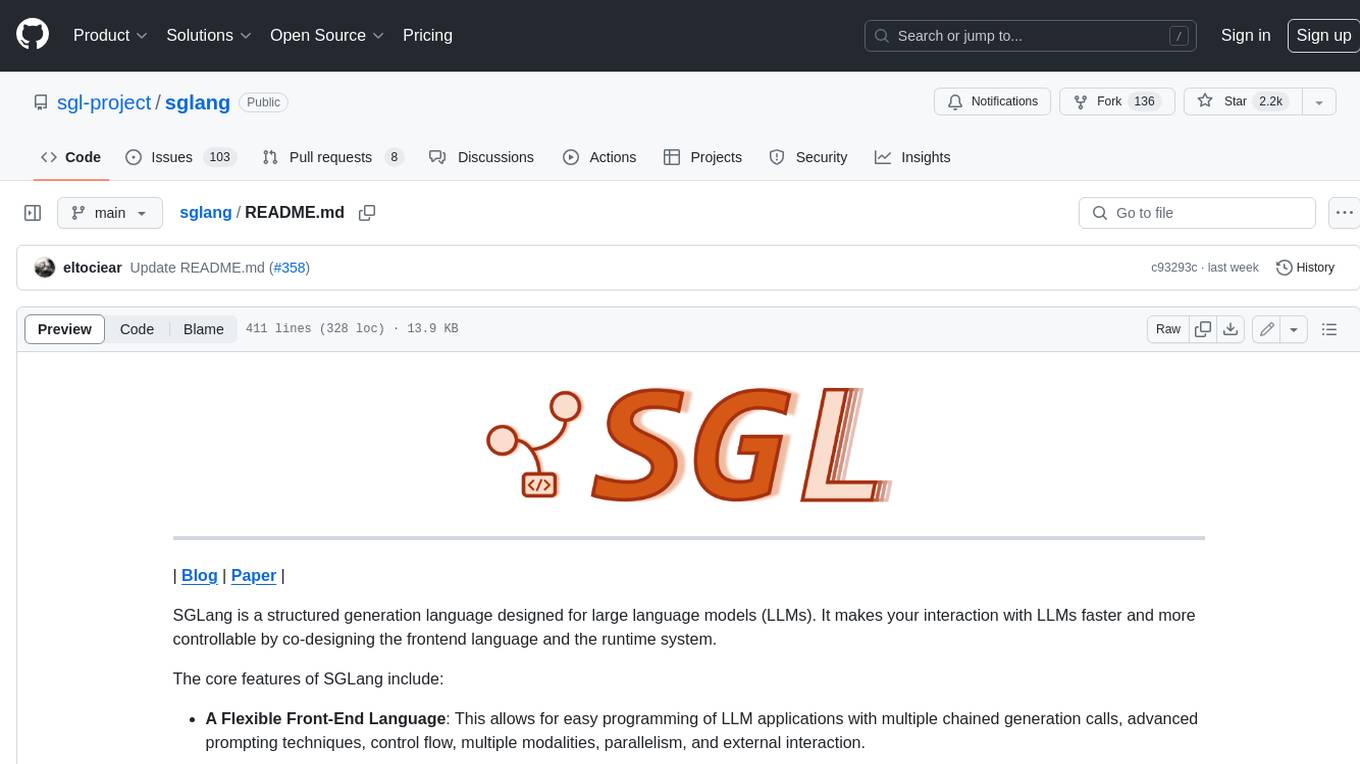
sglang
SGLang is a structured generation language designed for large language models (LLMs). It makes your interaction with LLMs faster and more controllable by co-designing the frontend language and the runtime system. The core features of SGLang include: - **A Flexible Front-End Language**: This allows for easy programming of LLM applications with multiple chained generation calls, advanced prompting techniques, control flow, multiple modalities, parallelism, and external interaction. - **A High-Performance Runtime with RadixAttention**: This feature significantly accelerates the execution of complex LLM programs by automatic KV cache reuse across multiple calls. It also supports other common techniques like continuous batching and tensor parallelism.
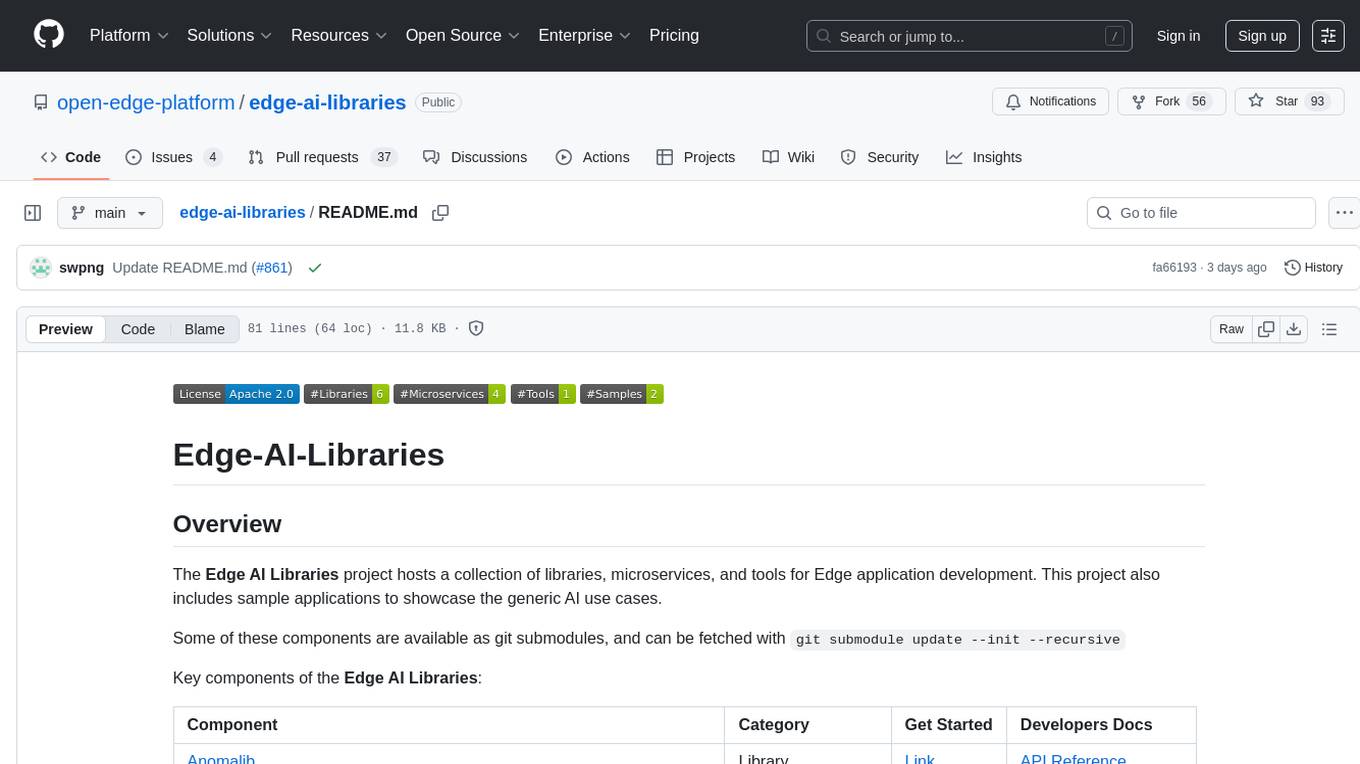
edge-ai-libraries
The Edge AI Libraries project is a collection of libraries, microservices, and tools for Edge application development. It includes sample applications showcasing generic AI use cases. Key components include Anomalib, Dataset Management Framework, Deep Learning Streamer, ECAT EnableKit, EtherCAT Masterstack, FLANN, OpenVINO toolkit, Audio Analyzer, ORB Extractor, PCL, PLCopen Servo, Real-time Data Agent, RTmotion, Audio Intelligence, Deep Learning Streamer Pipeline Server, Document Ingestion, Model Registry, Multimodal Embedding Serving, Time Series Analytics, Vector Retriever, Visual-Data Preparation, VLM Inference Serving, Intel Geti, Intel SceneScape, Visual Pipeline and Platform Evaluation Tool, Chat Question and Answer, Document Summarization, PLCopen Benchmark, PLCopen Databus, Video Search and Summarization, Isolation Forest Classifier, Random Forest Microservices. Visit sub-directories for instructions and guides.
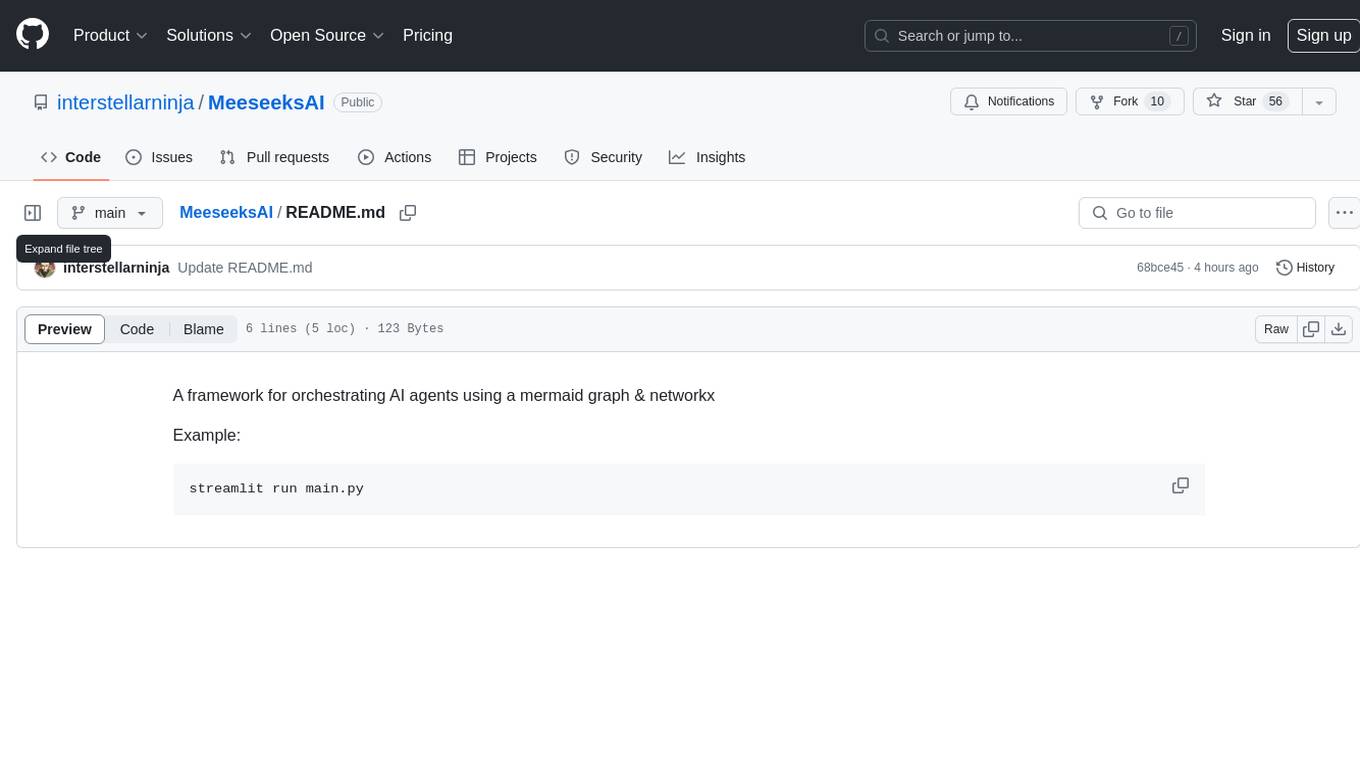
MeeseeksAI
MeeseeksAI is a framework designed to orchestrate AI agents using a mermaid graph and networkx. It provides a structured approach to managing and coordinating multiple AI agents within a system. The framework allows users to define the interactions and dependencies between agents through a visual representation, making it easier to understand and modify the behavior of the AI system. By leveraging the power of networkx, MeeseeksAI enables efficient graph-based computations and optimizations, enhancing the overall performance of AI workflows. With its intuitive design and flexible architecture, MeeseeksAI simplifies the process of building and deploying complex AI systems, empowering users to create sophisticated agent interactions with ease.
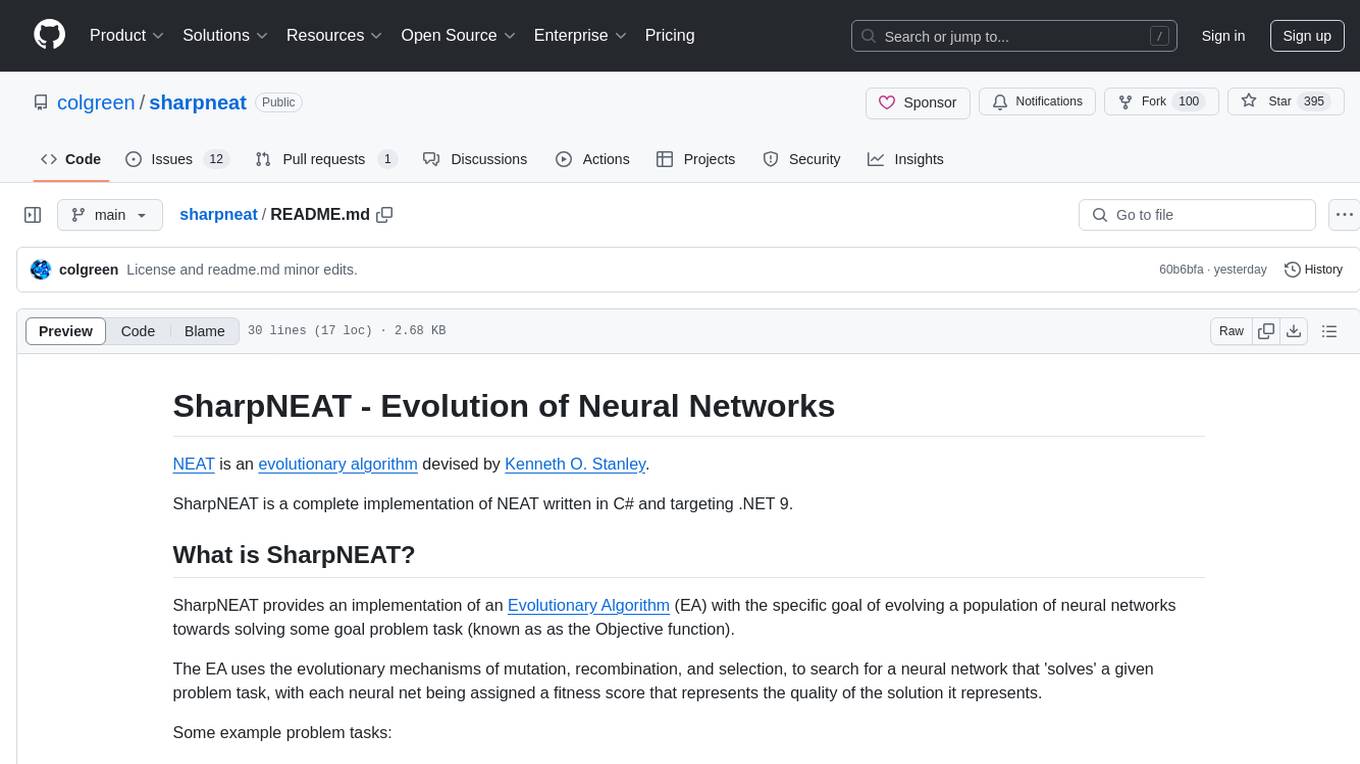
sharpneat
SharpNEAT is a complete implementation of NEAT written in C# and targeting .NET 9. It provides an implementation of an Evolutionary Algorithm (EA) with the specific goal of evolving a population of neural networks towards solving some goal problem task. The framework facilitates research into evolutionary computation and specifically evolution of neural networks, allowing for modular experimentation with genetic coding and evolutionary algorithms.

lemonai
LemonAI is a versatile machine learning library designed to simplify the process of building and deploying AI models. It provides a wide range of tools and algorithms for data preprocessing, model training, and evaluation. With LemonAI, users can easily experiment with different machine learning techniques and optimize their models for various tasks. The library is well-documented and beginner-friendly, making it suitable for both novice and experienced data scientists. LemonAI aims to streamline the development of AI applications and empower users to create innovative solutions using state-of-the-art machine learning methods.
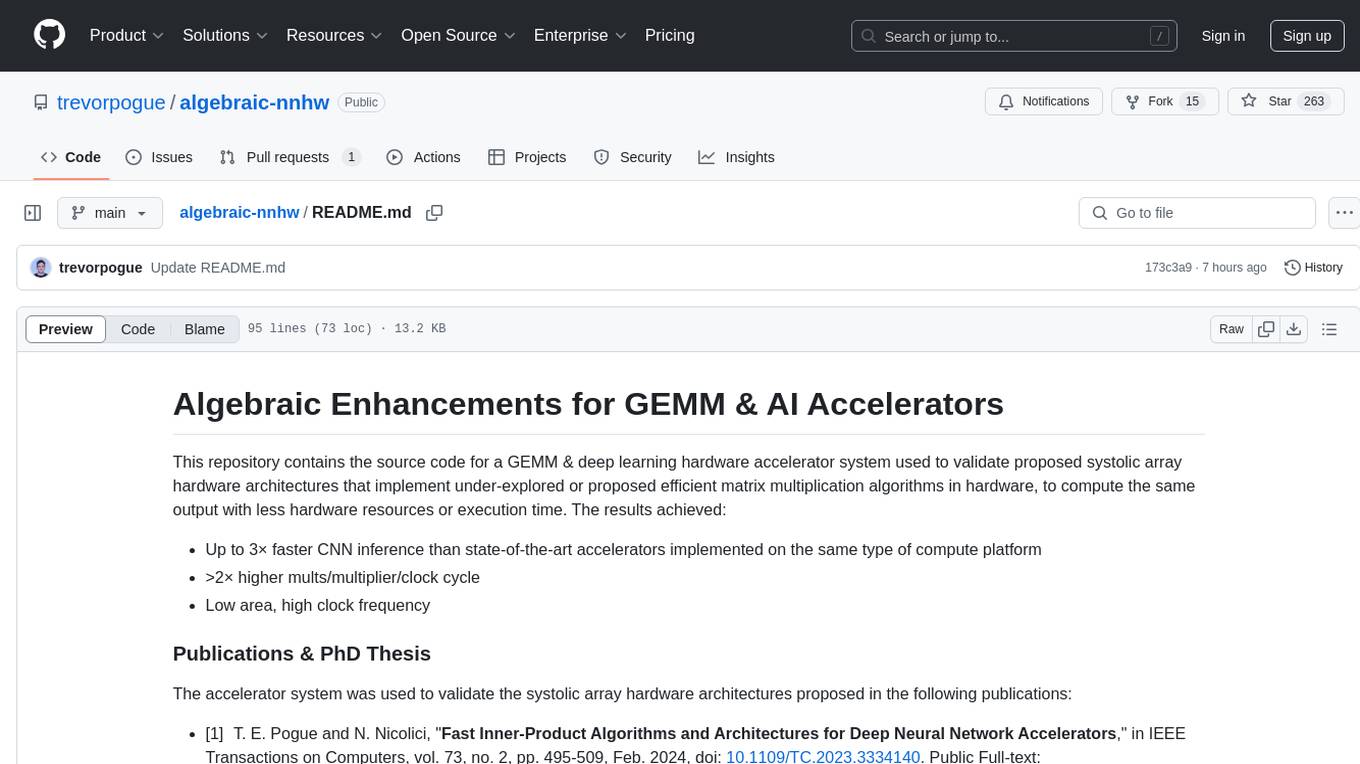
algebraic-nnhw
This repository contains the source code for a GEMM & deep learning hardware accelerator system used to validate proposed systolic array hardware architectures implementing efficient matrix multiplication algorithms to increase performance-per-area limits of GEMM & AI accelerators. Achieved results include up to 3× faster CNN inference, >2× higher mults/multiplier/clock cycle, and low area with high clock frequency. The system is specialized for inference of non-sparse DNN models with fixed-point/quantized inputs, fully accelerating all DNN layers in hardware, and highly optimizing GEMM acceleration.
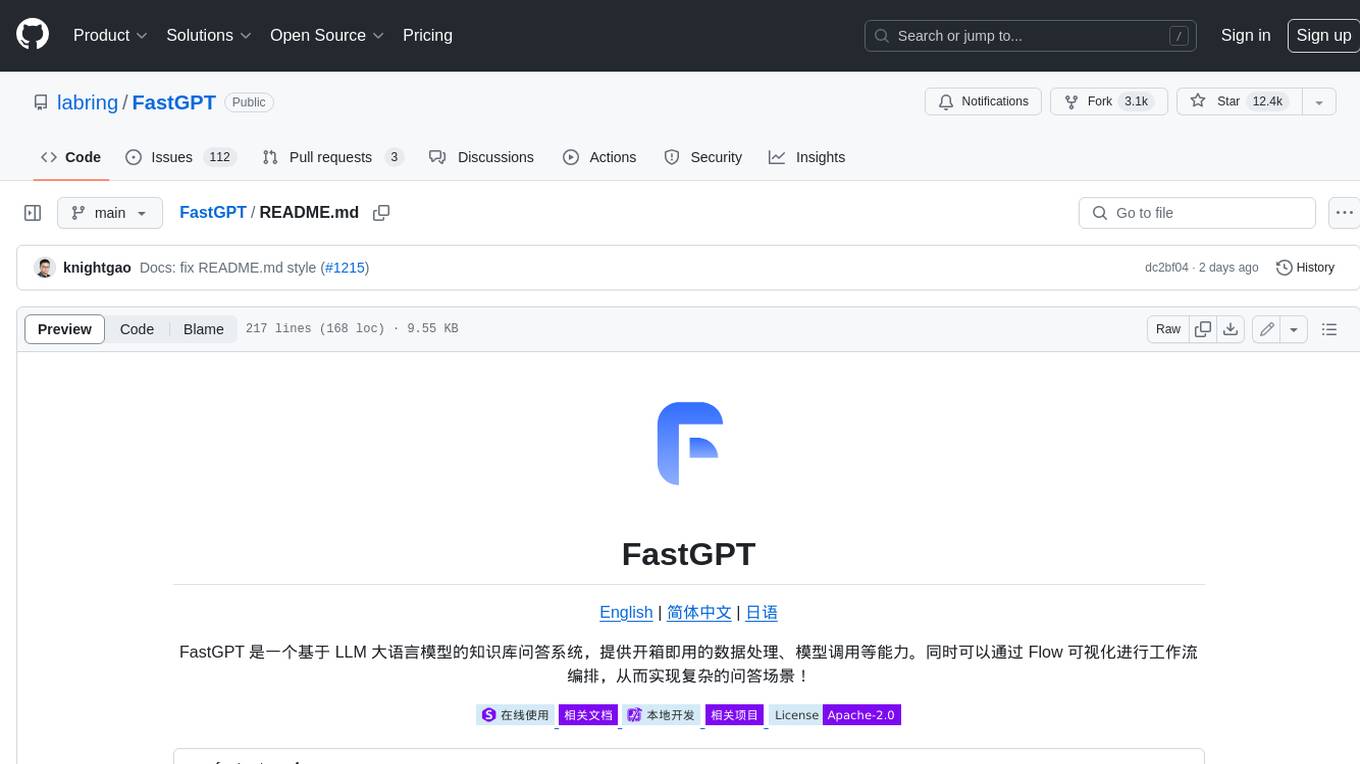
FastGPT
FastGPT is a knowledge base Q&A system based on the LLM large language model, providing out-of-the-box data processing, model calling and other capabilities. At the same time, you can use Flow to visually arrange workflows to achieve complex Q&A scenarios!
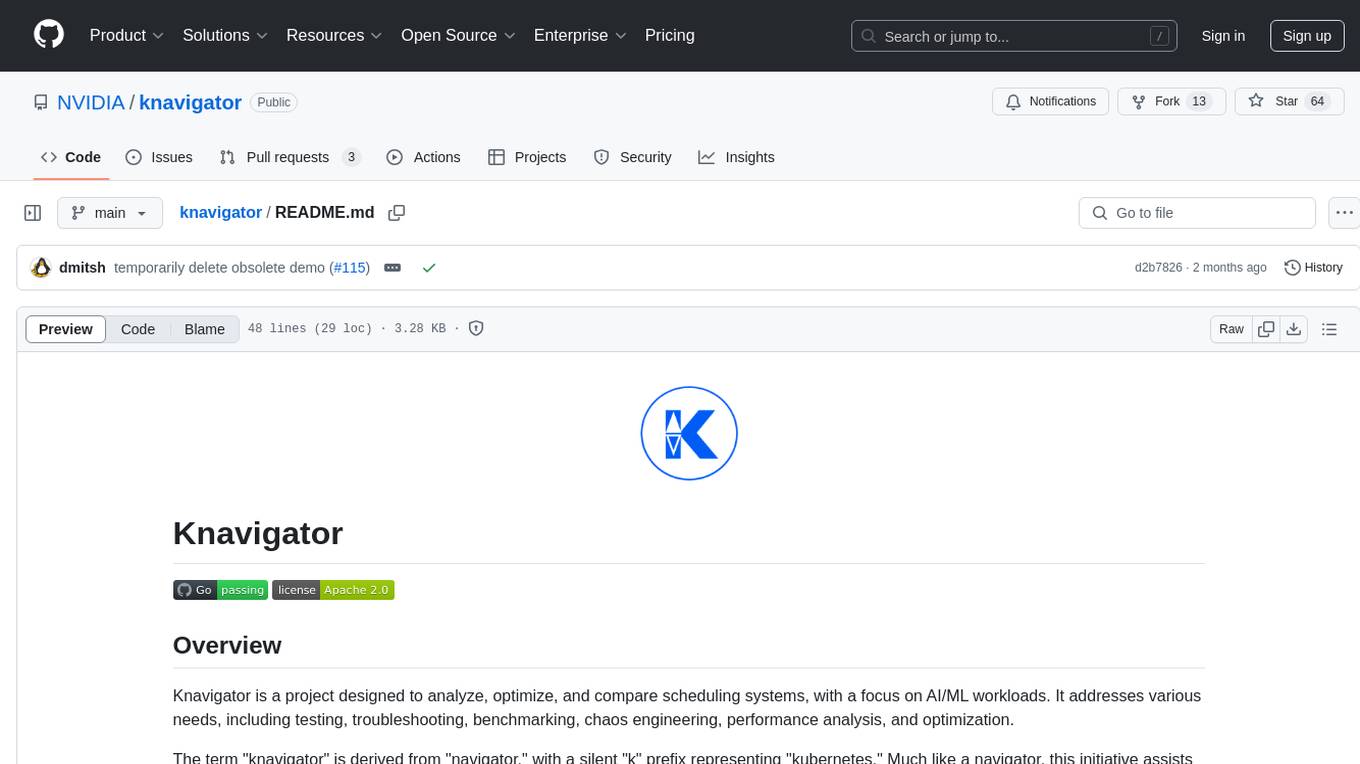
knavigator
Knavigator is a project designed to analyze, optimize, and compare scheduling systems, with a focus on AI/ML workloads. It addresses various needs, including testing, troubleshooting, benchmarking, chaos engineering, performance analysis, and optimization. Knavigator interfaces with Kubernetes clusters to manage tasks such as manipulating with Kubernetes objects, evaluating PromQL queries, as well as executing specific operations. It can operate both outside and inside a Kubernetes cluster, leveraging the Kubernetes API for task management. To facilitate large-scale experiments without the overhead of running actual user workloads, Knavigator utilizes KWOK for creating virtual nodes in extensive clusters.
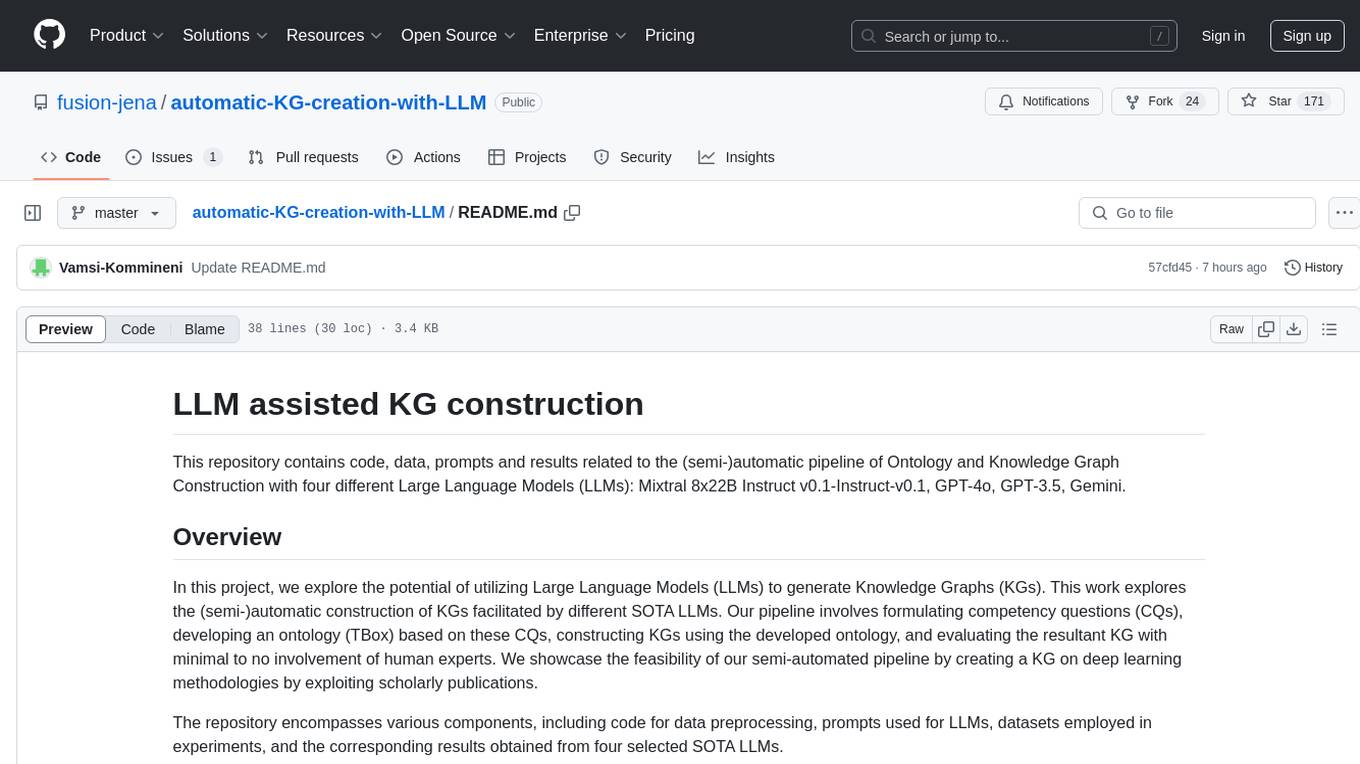
automatic-KG-creation-with-LLM
This repository presents a (semi-)automatic pipeline for Ontology and Knowledge Graph Construction using Large Language Models (LLMs) such as Mixtral 8x22B Instruct v0.1, GPT-4o, GPT-3.5, and Gemini. It explores the generation of Knowledge Graphs by formulating competency questions, developing ontologies, constructing KGs, and evaluating the results with minimal human involvement. The project showcases the creation of a KG on deep learning methodologies from scholarly publications. It includes components for data preprocessing, prompts for LLMs, datasets, and results from the selected LLMs.
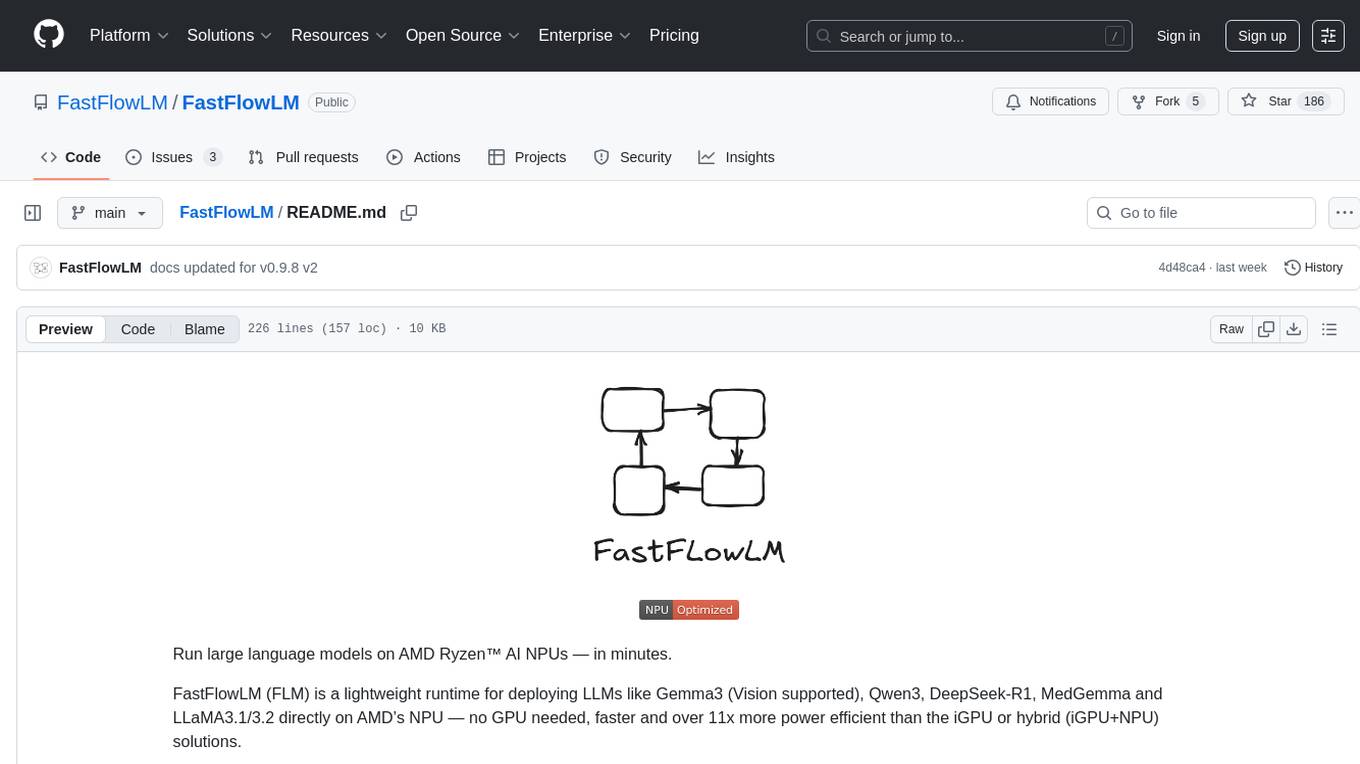
FastFlowLM
FastFlowLM is a Python library for efficient and scalable language model inference. It provides a high-performance implementation of language model scoring using n-gram language models. The library is designed to handle large-scale text data and can be easily integrated into natural language processing pipelines for tasks such as text generation, speech recognition, and machine translation. FastFlowLM is optimized for speed and memory efficiency, making it suitable for both research and production environments.
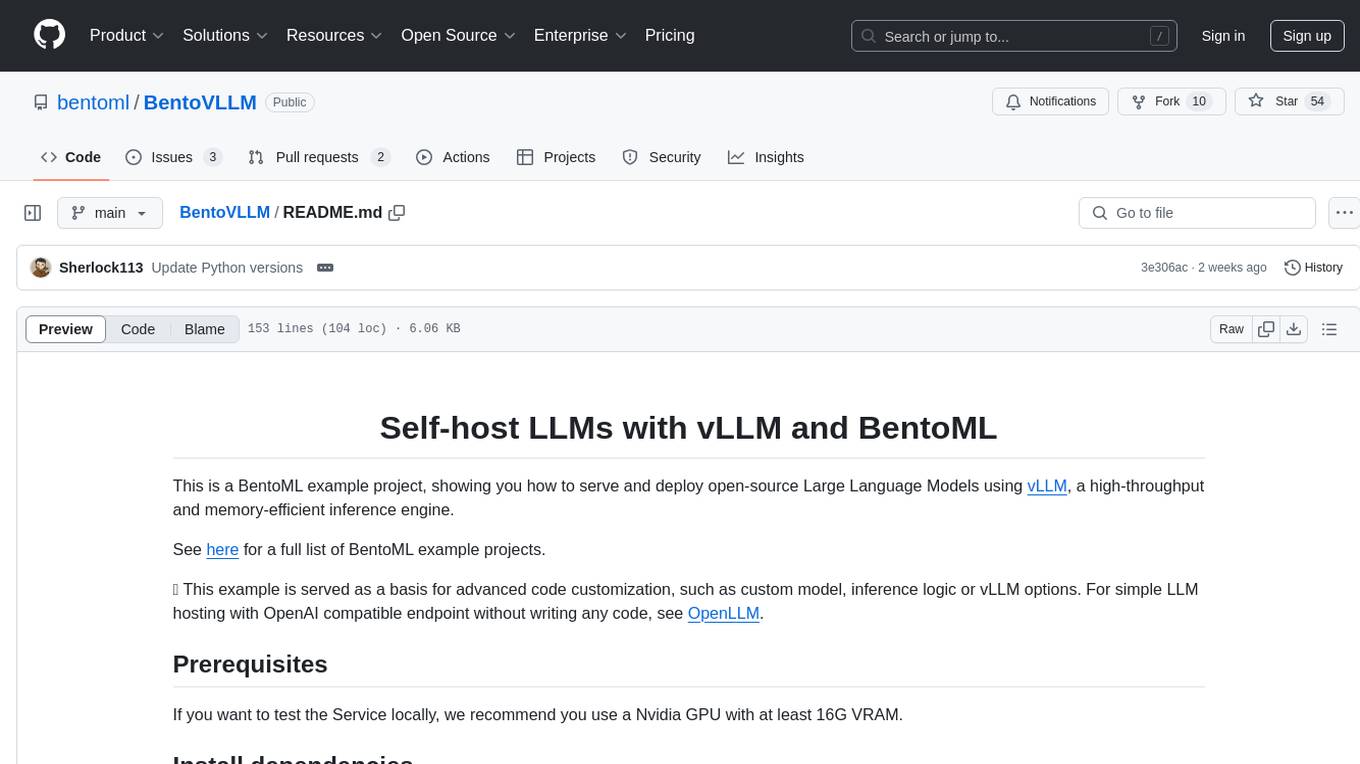
BentoVLLM
BentoVLLM is an example project demonstrating how to serve and deploy open-source Large Language Models using vLLM, a high-throughput and memory-efficient inference engine. It provides a basis for advanced code customization, such as custom models, inference logic, or vLLM options. The project allows for simple LLM hosting with OpenAI compatible endpoints without the need to write any code. Users can interact with the server using Swagger UI or other methods, and the service can be deployed to BentoCloud for better management and scalability. Additionally, the repository includes integration examples for different LLM models and tools.
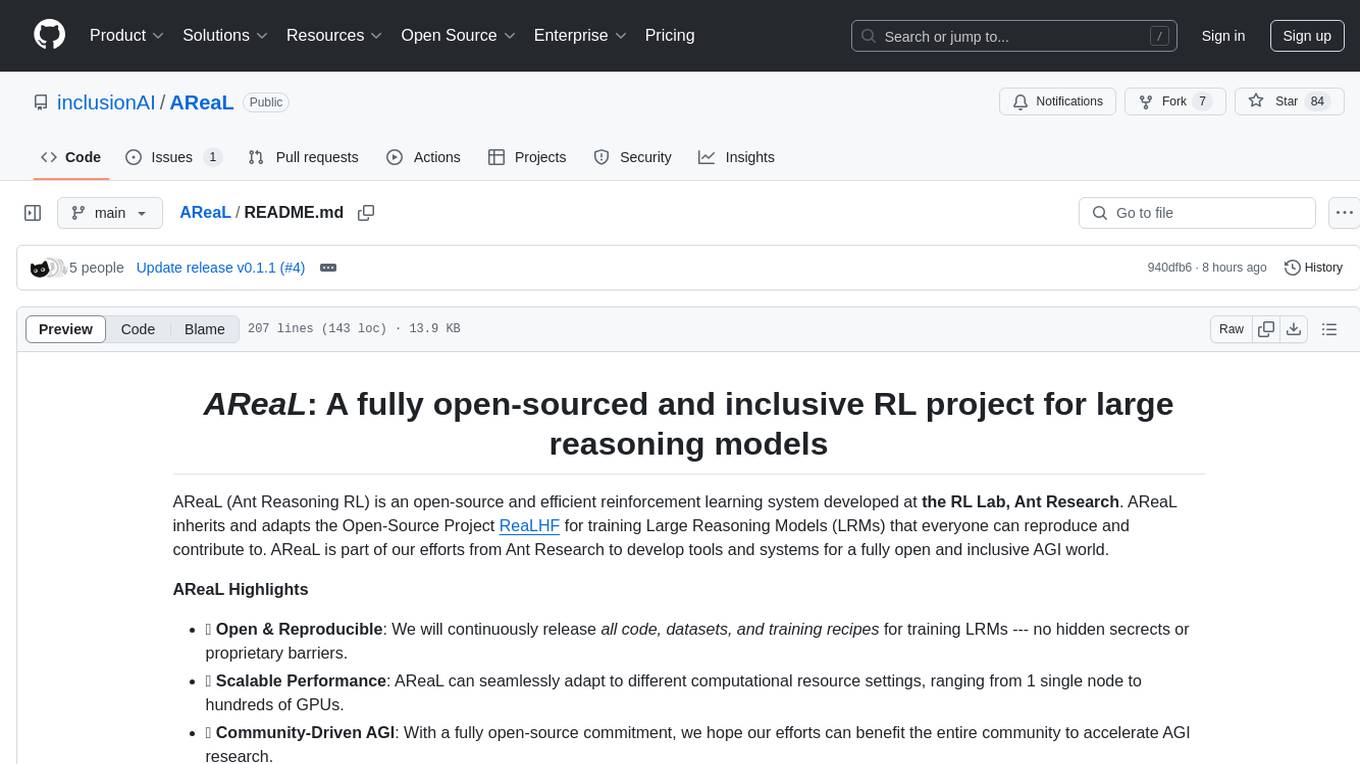
AReaL
AReaL (Ant Reasoning RL) is an open-source reinforcement learning system developed at the RL Lab, Ant Research. It is designed for training Large Reasoning Models (LRMs) in a fully open and inclusive manner. AReaL provides reproducible experiments for 1.5B and 7B LRMs, showcasing its scalability and performance across diverse computational budgets. The system follows an iterative training process to enhance model performance, with a focus on mathematical reasoning tasks. AReaL is equipped to adapt to different computational resource settings, enabling users to easily configure and launch training trials. Future plans include support for advanced models, optimizations for distributed training, and exploring research topics to enhance LRMs' reasoning capabilities.
For similar tasks

openspg
OpenSPG is a knowledge graph engine developed by Ant Group in collaboration with OpenKG, based on the SPG (Semantic-enhanced Programmable Graph) framework. It provides explicit semantic representations, logical rule definitions, operator frameworks (construction, inference), and other capabilities for domain knowledge graphs. OpenSPG supports pluggable adaptation of basic engines and algorithmic services by various vendors to build customized solutions.
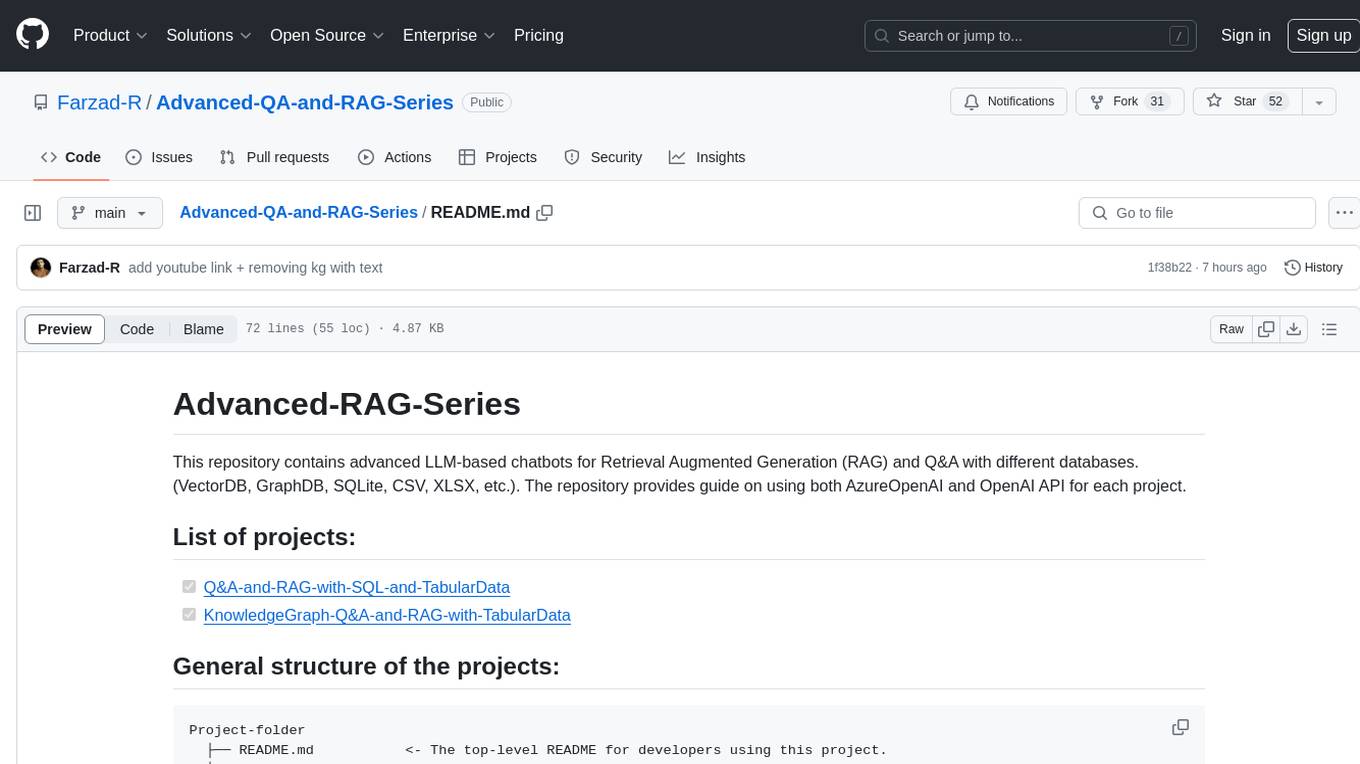
Advanced-QA-and-RAG-Series
This repository contains advanced LLM-based chatbots for Retrieval Augmented Generation (RAG) and Q&A with different databases. It provides guides on using AzureOpenAI and OpenAI API for each project. The projects include Q&A and RAG with SQL and Tabular Data, and KnowledgeGraph Q&A and RAG with Tabular Data. Key notes emphasize the importance of good column names, read-only database access, and familiarity with query languages. The chatbots allow users to interact with SQL databases, CSV, XLSX files, and graph databases using natural language.
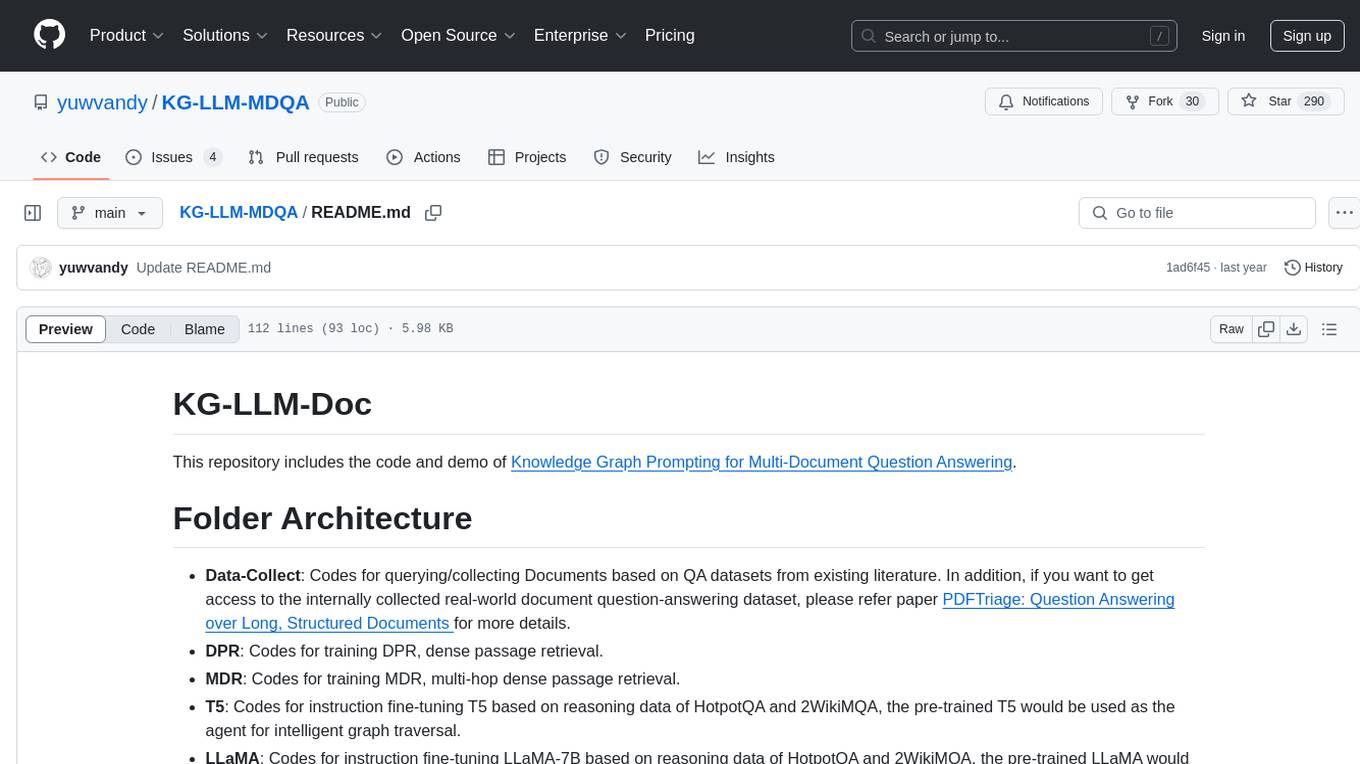
KG-LLM-MDQA
This repository contains code and demo for Knowledge Graph Prompting for Multi-Document Question Answering. It includes modules for data collection, training DPR and MDR models, fine-tuning T5 and LLaMA, and reproducing KGP-LLM algorithm. The workflow involves document collection, knowledge graph construction, fine-tuning models, and reproducing main table results. The repository provides instructions for environment setup, folder architecture, and running different modules.
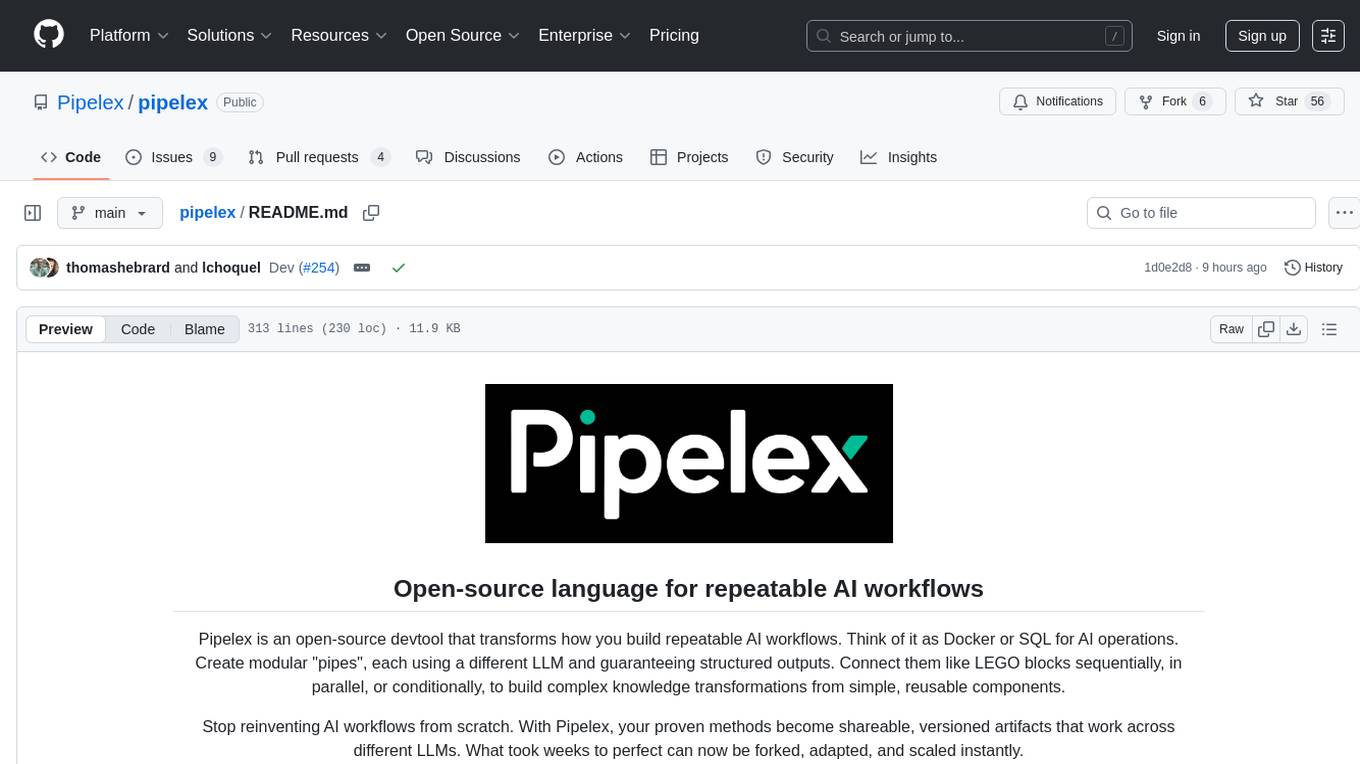
pipelex
Pipelex is an open-source devtool designed to transform how users build repeatable AI workflows. It acts as a Docker or SQL for AI operations, allowing users to create modular 'pipes' using different LLMs for structured outputs. These pipes can be connected sequentially, in parallel, or conditionally to build complex knowledge transformations from reusable components. With Pipelex, users can share and scale proven methods instantly, saving time and effort in AI workflow development.
For similar jobs

weave
Weave is a toolkit for developing Generative AI applications, built by Weights & Biases. With Weave, you can log and debug language model inputs, outputs, and traces; build rigorous, apples-to-apples evaluations for language model use cases; and organize all the information generated across the LLM workflow, from experimentation to evaluations to production. Weave aims to bring rigor, best-practices, and composability to the inherently experimental process of developing Generative AI software, without introducing cognitive overhead.

LLMStack
LLMStack is a no-code platform for building generative AI agents, workflows, and chatbots. It allows users to connect their own data, internal tools, and GPT-powered models without any coding experience. LLMStack can be deployed to the cloud or on-premise and can be accessed via HTTP API or triggered from Slack or Discord.

VisionCraft
The VisionCraft API is a free API for using over 100 different AI models. From images to sound.

kaito
Kaito is an operator that automates the AI/ML inference model deployment in a Kubernetes cluster. It manages large model files using container images, avoids tuning deployment parameters to fit GPU hardware by providing preset configurations, auto-provisions GPU nodes based on model requirements, and hosts large model images in the public Microsoft Container Registry (MCR) if the license allows. Using Kaito, the workflow of onboarding large AI inference models in Kubernetes is largely simplified.

PyRIT
PyRIT is an open access automation framework designed to empower security professionals and ML engineers to red team foundation models and their applications. It automates AI Red Teaming tasks to allow operators to focus on more complicated and time-consuming tasks and can also identify security harms such as misuse (e.g., malware generation, jailbreaking), and privacy harms (e.g., identity theft). The goal is to allow researchers to have a baseline of how well their model and entire inference pipeline is doing against different harm categories and to be able to compare that baseline to future iterations of their model. This allows them to have empirical data on how well their model is doing today, and detect any degradation of performance based on future improvements.

tabby
Tabby is a self-hosted AI coding assistant, offering an open-source and on-premises alternative to GitHub Copilot. It boasts several key features: * Self-contained, with no need for a DBMS or cloud service. * OpenAPI interface, easy to integrate with existing infrastructure (e.g Cloud IDE). * Supports consumer-grade GPUs.

spear
SPEAR (Simulator for Photorealistic Embodied AI Research) is a powerful tool for training embodied agents. It features 300 unique virtual indoor environments with 2,566 unique rooms and 17,234 unique objects that can be manipulated individually. Each environment is designed by a professional artist and features detailed geometry, photorealistic materials, and a unique floor plan and object layout. SPEAR is implemented as Unreal Engine assets and provides an OpenAI Gym interface for interacting with the environments via Python.

Magick
Magick is a groundbreaking visual AIDE (Artificial Intelligence Development Environment) for no-code data pipelines and multimodal agents. Magick can connect to other services and comes with nodes and templates well-suited for intelligent agents, chatbots, complex reasoning systems and realistic characters.

